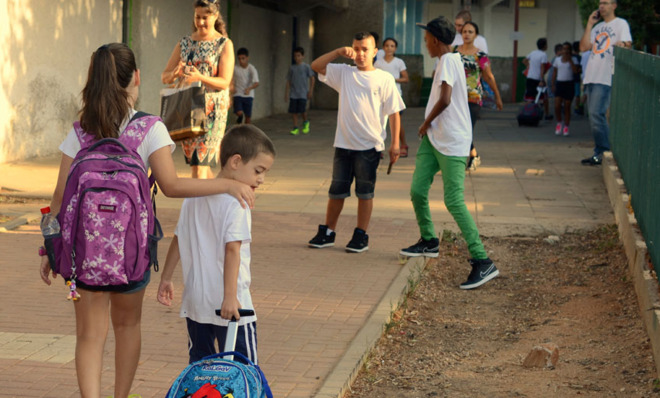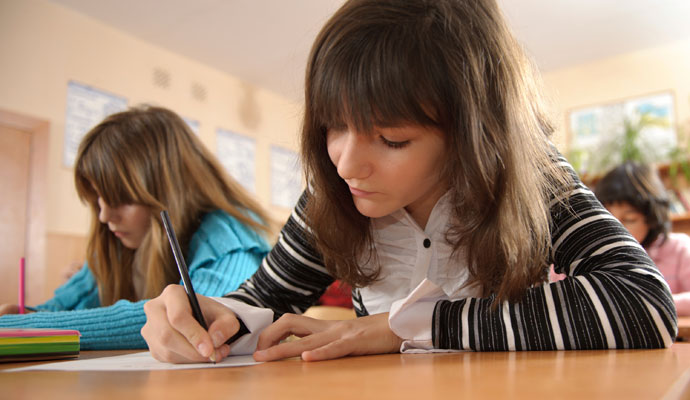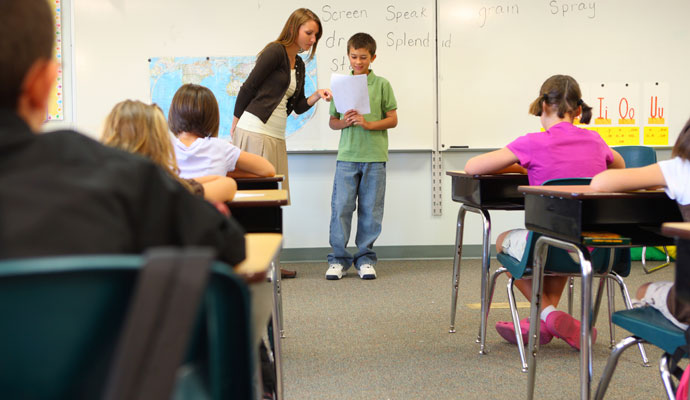I make six figures — and I still wouldn't send my kids to private school
Enrolling my kids in public schools turned out to be a choice I didn't regret

A free daily email with the biggest news stories of the day – and the best features from TheWeek.com
You are now subscribed
Your newsletter sign-up was successful

Getting a good education in Los Angeles is no easy feat. Just ask any parent, and they'll tell you: Schools in the area are pretty hit or miss.
The desirable ones — schools that tout heavy parent involvement and impressive graduation rates — are just as common as the relative horror shows with underfunded programs, overworked faculty and kids with behavior problems.
And that's exactly why my then-wife, Mary*, and I started researching the best neighborhoods and districts to move into well before our two children, Jenny* and Eric*, were ready to start kindergarten some 20 years ago. We looked for stable communities, nice neighbors and close proximity to places we frequented — ultimately settling on Burbank because it fit all of our criteria.
The Week
Escape your echo chamber. Get the facts behind the news, plus analysis from multiple perspectives.

Sign up for The Week's Free Newsletters
From our morning news briefing to a weekly Good News Newsletter, get the best of The Week delivered directly to your inbox.
From our morning news briefing to a weekly Good News Newsletter, get the best of The Week delivered directly to your inbox.
Another factor that was at the top of our list? We were only interested in sending our kids to public schools.
In fact, even though Mary and I could have afforded private tuition payments on our combined $250,000 income as a lawyer and a publicist, that kind of education was completely out of the question.
Why I'm so pro public school
Growing up in a working class, blue-collar Milwaukee town, I came up through the public school system. Heck, everyone in my neighborhood did. And looking back on my education, I'm confident it was a good one.
A free daily email with the biggest news stories of the day – and the best features from TheWeek.com
As I approached my college years, my decision to attend the University of Wisconsin — another publicly-funded school — was a no-brainer. Why pay an arm and a leg at a private institution when there was a great school nearby at a fraction of the price?
My time at UW cost me roughly $500 to $700 a semester, which I paid for by working about 35 hours a week in customer service at The Milwaukee Journal. My parents helped as much as they could, but I ultimately had to take out a $2,000 loan to finance my studies — a number I imagine would have been much higher had I opted for private school.
When Mary, my college sweetheart, and I moved out to L.A. after graduating in 1985, I couldn't help but notice a very different educational system than the one I'd grown up in. For starters, there were far more private schools than public ones, which was especially true in more upscale areas. Second, the available public school options varied greatly from neighborhood to neighborhood — particularly as it related to the quality of teachers.
But even though private schools were easier to find and probably represented a great educational choice for some parents, going that route simply wasn't something Mary — a product of the public school system, as well — and I ever entertained.
Don't get me wrong — I don't have an ax to grind with private schools. In fact, I have no problem with private education … except for what it does to public schools.
In my opinion, more private schools in a particular area equals fewer resources for neighboring public ones. Think about it: If I were already spending $20,000 a year to send a kid to private school, would I really feel inclined to support a referendum to replace infrastructure and install new air conditioners in public schools?

I also can't help but feel that it's very cyclical: Public schools get less and less support, and as a result, parents feel forced to enroll their kids in private schools.
In a nutshell, I've always felt that when the community has a vested interest in making public schools the best they can be, those schools will excel. After all, our society is only as good as its education system.
Another public school positive that I value is the culturally enriching experience they offer. In the private schools here in L.A., everybody's showing up in a BMW or Mercedes. Some parents consider these private schools to be a nice, secure environment for their kids, and I understand that. The majority of people in my social and professional circles went the private school route, and I respected their decisions — the same way they respected mine. But I wanted Jenny and Eric to be exposed to other socioeconomic statuses.
After all, we don't live in a bubble, so I wanted my kids to benefit from knowing people they otherwise wouldn't have had the opportunity to meet. Plus, I believe that socializing at an early age with people from all walks of life better prepares you to thrive in a diversified work setting as an adult. In a private school, kids are exposed to other kids just like themselves.
But, at the end of the day, what I love most about public schools is that enrolling Jenny and Eric turned out to be a choice I didn't regret. Even when we were confronted with a real obstacle, the public school system didn't let us down.
Paving our path through the public school system
While Jenny always excelled academically, we noticed that Eric started to struggle in middle school. Naturally, Mary and I were worried, but we wanted to give him the chance to improve on his own. When that didn't happen, we sought out counseling, testing and other assessments for him — but it didn't seem to help that much. By the time Eric was a high school freshman, he was having a hard time keeping up with his peers.
For the first time, Mary and I started to wonder: Is Eric a kid who truly needs a specialized academic setting in order to thrive? If the public school system couldn't meet his needs, we decided that moving him to a private school would be our Plan B.
Fortunately, we got to stick with Plan A. Mary and I scheduled a meeting with Eric's school and expressed our concerns about his performance. And we were happy to initiate the conversation because we believe that it's the parents' responsibility — not a teacher's — to keep tabs on a child's academic performance. To our relief, we were met with receptive teachers who put together an individualized education plan for him, which included extra time on tests and additional tutoring on subjects he didn't understand.
We were impressed and pleased with the teachers who took the time to understand why Eric wasn't absorbing the material as quickly as other students. And once that was addressed, I saw my son enjoying school again and finally excelling.
The whole process really underscored my belief that if you want to have a positive experience in public school, you have to ask for it — and work for it yourself. If I was a parent who simply sat back and refused to ask teachers to rally for my son, Eric may have very well slipped through the cracks and skated through the system.

What's more, the public school advantages we enjoyed weren't only academic. Another major benefit was the opportunity it gave my kids to experience more of life. Instead of paying thousands of dollars a year in private tuition, I had money in my budget to send Jenny on trips to Europe — France, Switzerland and more — during middle school and high school.
By the time she got to college, she was a worldwide traveler who'd been exposed to different cultures, traditions and languages — a benefit we really value as a family. I know her experiences helped shape her into the well-rounded person she is today.
As for Eric, a tuition-free budget allowed us to invest more in introspective activities, like father-son fishing trips. Again, I consider these experiences to be beyond valuable to his growth and development — way more than the violin lessons or performing arts activities he may have been exposed to in a private school.
Both Jenny and Eric loved the opportunities they were afforded as a result of going to public school — and never once expressed feeling resentful about missing out on going to private schools. In fact, I think their positive experiences laid the groundwork for their post-high school plans.
The true public school test: College decision time
When it came time to apply to college, my children knew my stance: I wanted them to attend public schools. After all, we'd been contributing to the system through property taxes for years, so why not put our already-spent money to good use?
It's tough to say whether my opinions ultimately influenced Jenny's final decision. Even though she applied and was accepted to the University of Southern California and Caltech — both private schools — she ultimately chose to attend UC Irvine for its science and biology programs.
Between tuition, parking passes and dorm expenses, Jenny's college education set us back over $100,000. But because I hadn't been laying out a fortune in private tuition for years, her mother and I were able to cover it all, so she wouldn't have to graduate with student debt.
As for Eric, he just graduated high school — and hasn't yet decided what his niche in life will be. He's not the kind of kid who will make a commitment to a four-year university unless he really feels strongly that it'll benefit him.
Right now, he's working on an eco tour on Catalina Island, spending his days running the zip lines, and has never been happier. When the time comes, he'll most likely attend community college and live at home — which I think is the best option for him.
The truth is that there's a heavy emphasis nowadays on pushing kids to excel the second they graduate from high school or college, but the majority of them aren't given the time to take a break and catch their breath.
Sometimes I wonder: If I'd invested a ton of money in private schooling, would I feel more inclined to push my kids into using the education I'd paid so much for? It makes me happy to know that I'm not putting that kind of pressure on my children.
And that only goes to reinforce my feelings about the public school system — and how happy I am with our experience. It feels good to know that I didn't turn my back on the schools in my community. I'd also like to believe that my heavy involvement in these schools helped pave the way for other kids to get a better public-school education, too.
*Names have been changed.
This story was originally published on LearnVest. LearnVest is a program for your money. Read their stories and use their tools at LearnVest.com.
More from LearnVest...
-
 Film reviews: ‘Send Help’ and ‘Private Life’
Film reviews: ‘Send Help’ and ‘Private Life’Feature An office doormat is stranded alone with her awful boss and a frazzled therapist turns amateur murder investigator
-
 Movies to watch in February
Movies to watch in Februarythe week recommends Time travelers, multiverse hoppers and an Iraqi parable highlight this month’s offerings during the depths of winter
-
 ICE’s facial scanning is the tip of the surveillance iceberg
ICE’s facial scanning is the tip of the surveillance icebergIN THE SPOTLIGHT Federal troops are increasingly turning to high-tech tracking tools that push the boundaries of personal privacy